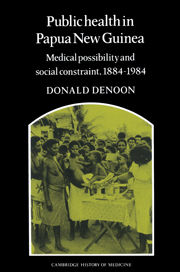Book contents
- Frontmatter
- Contents
- Acknowledgements
- Maps of Papua New Guinea
- Introduction
- I The rise and fall of tropical medicine
- II The rise and fall of the great campaigns
- 8 Miracle drugs, new perceptions and the post-war Public Health Department
- 9 The health campaigns
- 10 Women and children last
- 11 Health education
- 12 A national health system
- 13 Primary health care
- 14 The past and the future
- Notes
- Bibliography
- Index
12 - A national health system
Published online by Cambridge University Press: 11 February 2010
- Frontmatter
- Contents
- Acknowledgements
- Maps of Papua New Guinea
- Introduction
- I The rise and fall of tropical medicine
- II The rise and fall of the great campaigns
- 8 Miracle drugs, new perceptions and the post-war Public Health Department
- 9 The health campaigns
- 10 Women and children last
- 11 Health education
- 12 A national health system
- 13 Primary health care
- 14 The past and the future
- Notes
- Bibliography
- Index
Summary
By the 1960s, health services were fragmented: each piece the product of historical conditions which were passing away. Each of the major mission societies operated an autonomous health care service, focused on the area where that mission predominated. Within the Public Health Department, the Division of Maternal and Child Health (with its own Deputy Director) ran programmes catering to quite distinct public needs; and the units (waging the campaigns) specialised in the control of one infection each. A District Medical Officer was simultaneously answerable to several regional supervisors of campaign units, and to the hierarchy of the department at large, centred in Port Moresby. If the District Medical Officer was baffled by competing demands on his time and resources, the aid post orderly was even more bewildered by the variety of medical specialists who passed through the village, sometimes offering assistance, sometimes demanding support, and at other times ignoring the aid post entirely.
If the dislocation was most acute in the department, it was in the missions that the strongest arguments were made for integration and a better planned service. One of the architects of integration, Dr Hakan Hellberg, recorded his impressions for the guidance of later historians. He identified several impulses towards change in the late 1960s:
Development towards self-government accelerated.
National churches started taking over responsibility from overseas mission groups.
[…]
- Type
- Chapter
- Information
- Public Health in Papua New GuineaMedical Possibility and Social Constraint, 1884–1984, pp. 99 - 104Publisher: Cambridge University PressPrint publication year: 1989

